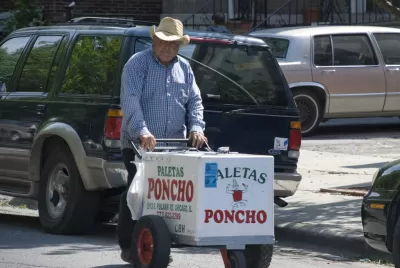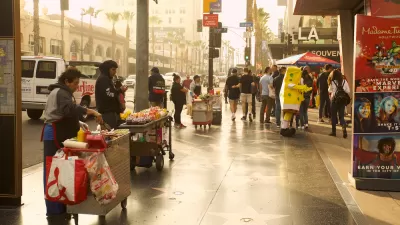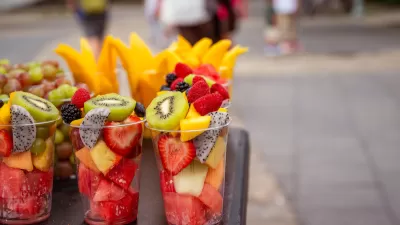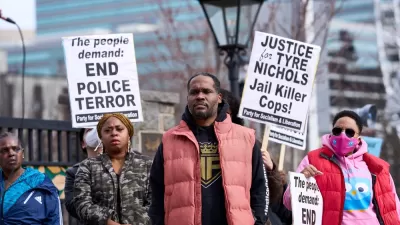While recent crackdowns on street vending suggest it is a problem to be fixed, the reality is that street vendors energize urban spaces and make them more accessible for everyone.

Alissa Walker makes the case that street vendors contribute to public spaces in important ways. "In places where city leaders have made very little effort to improve the experience for those walking, biking, or riding transit, it’s the people selling goods or serving food in those same spaces who make streets vibrant, welcoming, and safe for all."
She says that the role of vendors is most evident in the most neglected parts of cities, which feel unsafe without the presence of people. "Waiting for the bus alone at night, at a poorly lit corner in front of a vacant building, just hearing the scrape of plastic stools at the taco stand posted up outside a nearby auto body shop is comforting. I can confidently say I feel safer because people are prepping, cooking, and devouring al pastor on my sidewalk," says Walker.
Street vendors are not criminals, argues Walker, and the recent handcuffing of a churro vendor in a New York City subway station is an example of unnecessary policing of urban spaces. The arguments against street vending, that vendors pose a danger or block sidewalks, are not valid, she says. "When law enforcement officials see a churro cart as an obstacle, they likely don’t understand the value that a churro cart provides to the rest of us."
FULL STORY: Why street vendors make cities feel safer

Alabama: Trump Terminates Settlements for Black Communities Harmed By Raw Sewage
Trump deemed the landmark civil rights agreement “illegal DEI and environmental justice policy.”

Planetizen Federal Action Tracker
A weekly monitor of how Trump’s orders and actions are impacting planners and planning in America.

Why Should We Subsidize Public Transportation?
Many public transit agencies face financial stress due to rising costs, declining fare revenue, and declining subsidies. Transit advocates must provide a strong business case for increasing public transit funding.

Understanding Road Diets
An explainer from Momentum highlights the advantages of reducing vehicle lanes in favor of more bike, transit, and pedestrian infrastructure.

New California Law Regulates Warehouse Pollution
A new law tightens building and emissions regulations for large distribution warehouses to mitigate air pollution and traffic in surrounding communities.

Phoenix Announces Opening Date for Light Rail Extension
The South Central extension will connect South Phoenix to downtown and other major hubs starting on June 7.
Urban Design for Planners 1: Software Tools
This six-course series explores essential urban design concepts using open source software and equips planners with the tools they need to participate fully in the urban design process.
Planning for Universal Design
Learn the tools for implementing Universal Design in planning regulations.
Caltrans
Smith Gee Studio
Institute for Housing and Urban Development Studies (IHS)
City of Grandview
Harvard GSD Executive Education
Toledo-Lucas County Plan Commissions
Salt Lake City
NYU Wagner Graduate School of Public Service





























